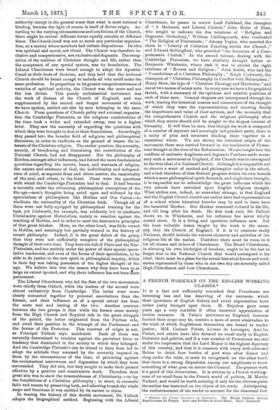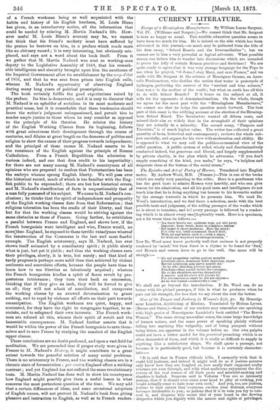A FRENCH WORKMAN ON THE ENGLISH WORKING CLASSES.*
IT is a fact not sufficiently remarked that Frenchmen are- becoming less and less deserving of the sarcasms which their ignorance of English history and social organisation have rather justly brought upon them. M. Esquires gave some years ago a vary readable if often incorrect appreciation of insular manners. M. Taine's strictures on England, however limited their scope may be, contain a mass of acute observation to, the truth of which Englishmen themselves are bound to render justice ; MM. Casimir Perier, Leonce de Lavergne, Auld Ms Pichot, and others have also devoted no small study to English literature and politics, and if a vast number of Frenchmen are stilt wider the impression that the Lord Mayor is the highest dignitary of this country, and that it is common with every well-educated Briton to drink four bottles of port wino after dinner and sleep under the table, it must be recognised, on the other hand, that there is a strong disposition among our neighbours to know something of what goes on across the Channel. The present work. is a proof of this observation. It is written by a French working- man of no small fame in the French world of politics, M. Martin Nadaud, and would be worth noticing if only for the obvious pains the author has bestowed on the object of his study. Anticipating the embarrassment of the reader to account for the abnormal fact Ilistoire des Classes Ourrieres en Anyleterre. Par Martin Nadaud, Ancien Etcprdsentant du Peuple. Arec une Preface de Louis Blanc. Paris : Lachaud.
of a French workman being so well acquainted with the habits and history of his English brethren, M. Louis Blanc has given, in an introductory notice, all the information that could be needed by relating M. Martin Nadaud's life. How- ever useful 11L Louis Blanc's account may be, we cannot but think that his friend's modesty must have suffered by the praises he bestows on him, in a preface which reads more like an obituary record ; it is very interesting, but obviously mis- placed, and says not a word about the book itself. From it we gather that M. Martin Nadaud was sent as working-man deputy to the Legislative Assembly of 1849, that his remark- able intelligence and sincerity brought upon him the anathema of the Imperial Government after its establishment by the coup d'etat of 1851, and that he was sent from prison into English exile, whence M. Nadaud's opportunity of observing England daring many long years of political proscription.
The book certainly fulfils the good expectations raised by the preface. Its bias is democratic, and it is easy to discover that M. Nadaud is an upholder of socialism in its most moderate and practical sense, but it is remarkable that these tendencies should leave the writer's judgment unimpassioned, and permit him to render ample justice to those whom he may consider as opposed to the principle of his theories. He relates the history of the English Working Classes from its beginning, follows with great minuteness their development through the course of centuries, and dilates at great length on the demesne of politics and religion to show the causes of their progress towards independence; and the principal of these causes M. Nadaud asserts to be the resistance of the English against the principle of Roman Catholicism. From a French Republican the admission is curious indeed, and one that does credit to his impartiality ; for there are not many among M. Nadaud's countrymen of all opinions who are prepared to confess that Protestantism has been the embryo whence sprang English liberty. We will pass over the historical record, much of which is too familiar with the Eng- lish public to be expounded ; there are but few historical errors, and M. Nadaud's classification of facts is unquestionably that of a man fully possessed of his subject. We come to M. Nadaud's con- clusions; he thinks that the spirit of independence and prosperity of the English working classes date from that Reformation ; that religious toleration has been the cradle of their liberty, and that but for that the working classes would be striving against the same obstacles as those of France. Going farther, he establishes a parallel between France and England, and shows how, if the French bourgeoisie were intelligent and wise, France would, no morethan England, be exposed to those terrific cataclysms whereof the insurrection of the Commune is the last and most fearful example. The English aristocracy, says M. Nadaud, has ever shown itself animated by a conciliatory spirit ; it yields slowly what is just, but yet it yields ; and thus the working classes earn their privileges, slowly, it is true, but surely ; and that kind of tardy progress is perhaps more solid than that achieved by violent outbursts and convulsive efforts, because the people have time to learn how to use liberties so laboriously acquired ; whereas the French bourgeoisie kindles a spirit of fierce revolt by pre- posterous intolerance ; they turn their back on concession, thinking that if they give an inch, they will be forced to give an dl ; they will not admit of conciliation, and exasperate the working classes by an avowed determination to grant nothing, and to repel by violence all efforts on their part towards emancipation. The English workmen are quiet, happy, and contented, for they have the right to congregate together, to as- sociate, and to safeguard their own interests. The French work- men are refused all this, whence their spirit of revolt and the lamentable consequences. M. Nadaud further asserts that it would be within the power of the French bourgeoisie to save them- selves and to save France by studying the conduct of the English upper classes.
These conclusions are no doubt profound, and open a vast field for meditation. We are persuaded that if proper study were given in France to M. Nadaud's History, it might contribute to a great extent towards the peaceful solution of many social problems. There is no aristocracy in France, and the working classes are in a chronic state of fermentation ; per contra England offers a striking contrast ; and yet England has not suffered the same revolutionary tests. M. Martin Nadaud has done well to show his countrymen how England might possibly give them a useful lesson in what concerns the most portentous question of the time. We may add that a certain diffuseness of ideas, and some occasional misprints of English names, will not prevent M. Nadaud's book from giving pleasure and instruction to English, as well as to French readers.







































 Previous page
Previous page